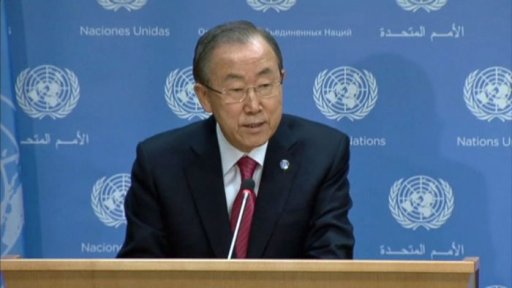
Recently I visited the Philippines. I saw yet again how climate change is — quite literally — an existential threat.
Guest Column by Ban Ki-Moon
I have seen the same threat in the Sahel, Kiribati and many other places. We have to limit global temperature rise or we will never achieve sustainable development and eradicate extreme poverty.
The risks are global. To communities. To businesses, small and large. To the security of nations.
But addressing climate change is also a great opportunity to support all our sustainable development goals.
At the same time, the actions we take on sustainable development can help tackle climate change. The two are interdependent and mutually supporting.
Investment now will result in major savings in the future, and can propel economic growth today. It can support universal energy access, sustainable cities and well-being for people and the planet.
We know climate change poses significant risks to people, economies and businesses. We also know that limiting global temperature rise and advancing sustainable development will require considerable investment.
- Chamisa under fire over US$120K donation
- Mavhunga puts DeMbare into Chibuku quarterfinals
- Pension funds bet on Cabora Bassa oilfields
- Councils defy govt fire tender directive
Keep Reading
For those who are prepared to lead, the opportunities are boundless.
Clean energy; sustainable production and consumption and environmentally-sound transport and urban planning are good for the planet, good for people and good for business.
They can create new jobs, new markets and boost economies.
In September, I will host a Summit on Climate Change for global leaders from government, business, finance, knowledge institutions and civil society. It will be a different kind of summit. An action summit!
The summit has two goals: To catalyse ambitious action on the ground to reduce emissions and strengthen climate resilience.
And to mobilise political will for a meaningful global legal climate agreement by 2015.
The next two years are critical.
2015 is also the deadline for the Millennium Development Goals and defining a post-2015 development agenda.
Our objectives will need the ambition and participation of all actors. For those of you that are not already members, I commend to you the Global Compact Caring for Climate initiative.
I am looking for new commitments and substantial, scalable and replicable contributions to a low-carbon economy.
The Summit is your opportunity to show what you can and will do, and to work with governments at the highest level to address climate change.
An ambitious 2015 climate agreement needs strong financial foundations.
We need to create bankable projects at scale and financial mechanisms to support climate actions at country level.
We must focus on high-impact opportunities for unlocking clean investments. We must close the viability gap between green and carbon-intensive projects. And, we must reduce or eliminate the policy risks currently associated with low-carbon investments.
I see three areas for action — public finance, private finance and the Green Climate Fund. First, public finance.
We need large injections of public capital for the rapid development of low-carbon infrastructure. We need investors, banks and other financial service providers to increase finance flows into low-carbon energy and climate-resilient infrastructure, including through setting portfolio targets and increasing the deployment of climate bonds.
Climate finance is an investment in the future. It must not be taken hostage by short-term budget constraints.
Channelling public finance at scale is also crucial to encouraging private finance.
Smart public financing can encourage local and international private investments.
This is my second point: Private investment is essential to meeting the growing demand for energy in the developing world.
I have been meeting with key representatives of all asset classes to discuss how they can contribute.
We need in particular to win over institutional investors that collectively manage more than 70 trillion Euros of assets.
The bulk of these investments are high-carbon assets. These investors have the power — and I believe the responsibility — to help transform the global economy.
My third point concerns the Green Climate Fund.
The Fund cannot be the exclusive conduit for climate finance.
But it will be an important part of a public-private framework that supports low-carbon investment and fair access to climate financing in developing countries.
We need to bring it into operation as soon as possible.
We need more public finance, more private finance and better mechanisms for channelling investments to where they are most needed. The finance community is a key player.
We need trillions of dollars of investment to move from the brown to the green economy. I see four areas for action.
I urge public and private actors to rise to the challenge in the coming months and rally around a key number of concrete action-oriented solutions for the Climate Summit.
This could include, but I hope won’t be limited to, a range of public and private institutions working closely with those governments that have developed plans and are most investment ready. Perhaps a handful of governments and public and private partners could even be ready to show what this partnership could look like by the time of the Summit in September. You are here because you see the big picture. We have a real opportunity to transform our societies — to promote economic dynamism, social equity, and environmental sustainability. I count on you to lead by example within your governments, industries and networks and to bring bold announcements as well as the highest level of ambition to the Summit. Together, we can reshape our world in ways that will provide opportunity and hope to all seven billion people who share this planet.











